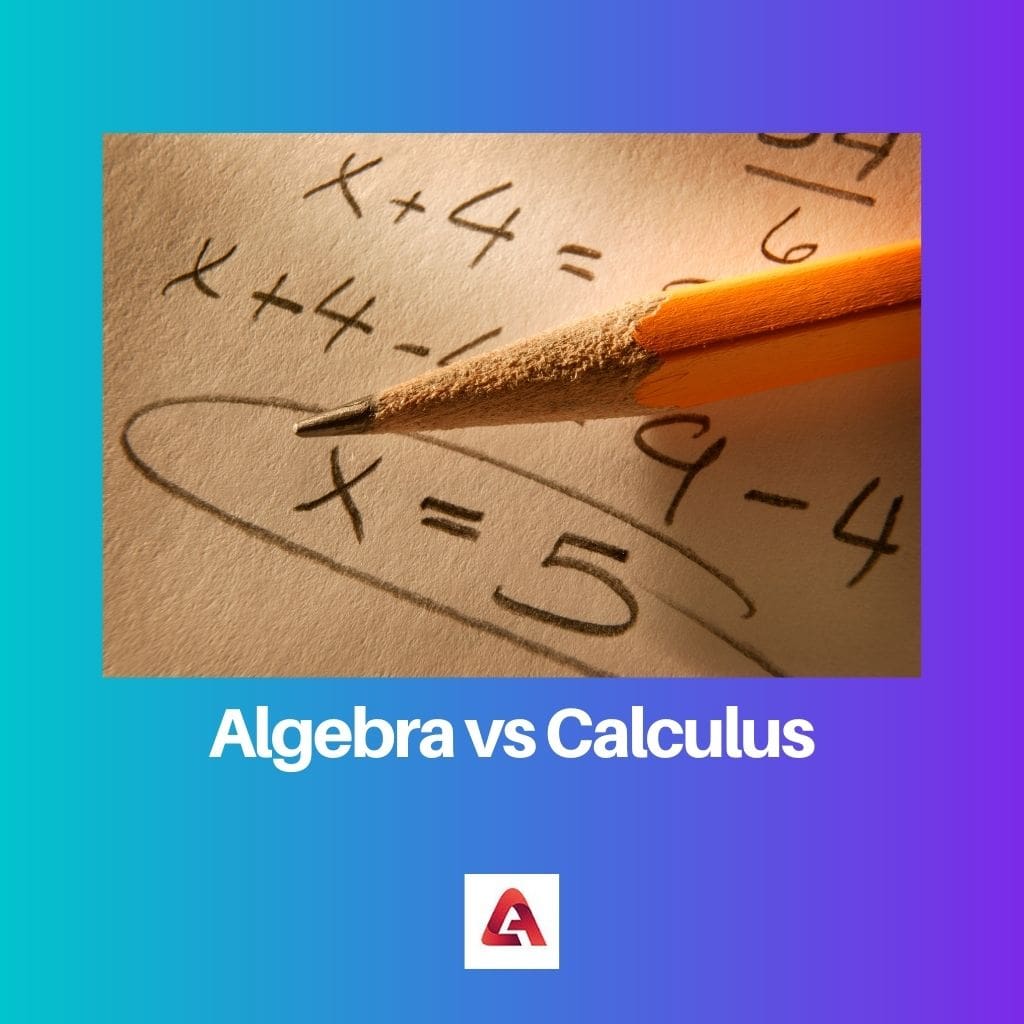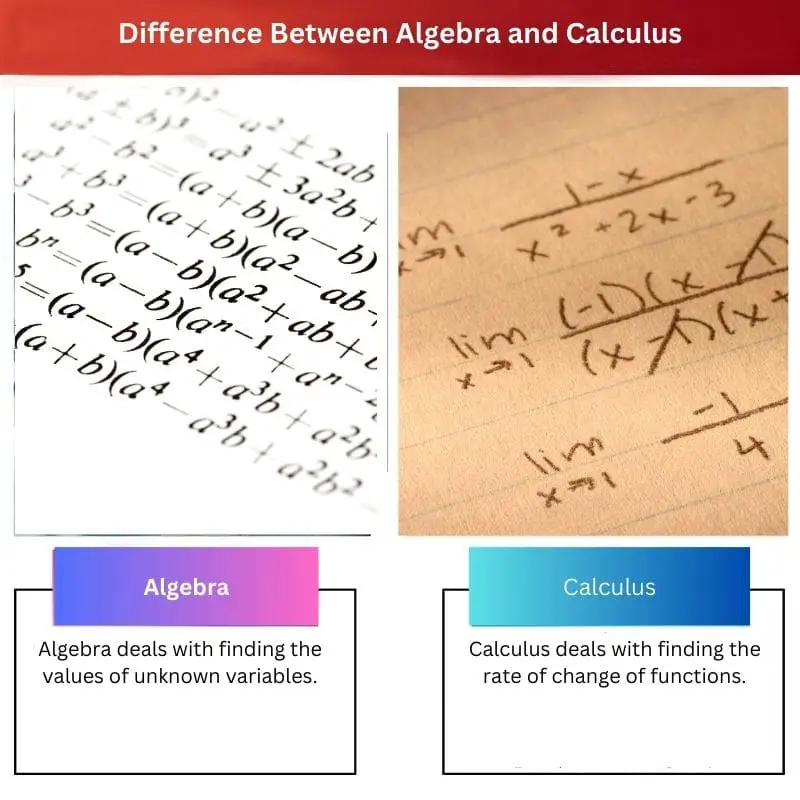Mathematics has its place in our everyday life. It helps in getting our problems solved systematically.
Mathematics has various branches: Algebra, Calculus, Trigonometry, Geometry, etc. Each branch has its importance and different applications.
Key Takeaways
- Algebra is a branch of mathematics that deals with symbols, variables, and the rules for manipulating them, focusing on solving equations and analyzing relationships between variables.
- Calculus is a branch of mathematics that studies change and motion, using concepts like limits, derivatives, and integrals to analyze functions and their rates of change.
- Both algebra and calculus are essential branches of mathematics, but algebra is concerned with solving equations and relationships between variables, while calculus focuses on analyzing change and motion.
Algebra vs Calculus
Algebra is the study of equations, inequalities, and functions, used in various fields such as engineering, physics, and computer science. Calculus is the study of continuous change and is used to analyze and model complex systems. It includes differential calculus, integral calculus, and multivariable calculus.

Algebra is a branch of mathematics based on modern arithmetic and modern mathematics. Algebra finds the values of the variables.
Calculus is a branch that is difficult to understand and used in advanced studies. Calculus studies the rate of change of events.
Comparison Table
| Parameter of Comparison | Algebra | Calculus |
|---|---|---|
| Basic idea | Algebra deals with finding the values of unknown variables. | Calculus deals with finding the rate of change of functions. |
| Origin time | Originating in ancient times, development dates back to the medieval period. | Originated during the 17th century. |
| Domain of work | Operates within a known domain and obtains the result within that. | Don’t have any specific domain; while solving the problem, one can learn new things, and results may or may not be in the domain. |
| Main operations | Solving equations. | Differentiation and Integration. |
| Uses | Used in everyday mathematics such as finding distance, displacement, the slope of the line, etc. | Used in complicated fields and advanced studies. |
What is Algebra?
A branch of mathematics that uses letters and symbols to represent numbers working on predefined rules. These symbols or letters are termed variables.
Therefore, it can be said that Algebra is a relationship between different variables defined by operators known as algebraic equations.
In other words, Algebra is generalized arithmetic where variables represent all the possible numbers in the place. Algebra helps in the formation of correlated equations and then solving them to obtain values of the variables.
The roots of algebra were laid down by the Babylonians, who were also responsible for developing advanced arithmetic. They developed formulas to solve problems using linear or quadratic equations.
During the time of Plato, Greeks developed another tactic to deal with such problems, which they termed Geometric Algebra. A Greek mathematician, Diophantus later became known as the “father of algebra”.
The first complete solution, including zero and negative values to the algebraic equations, was given by an Indian mathematician Brahmagupta in his book Brahmasphitasiddhanta.
During the 16th century, Francois Viete’s works proved to be an essential step towards the development of modern algebra. In the mid-16th century, another event that marked the further development of algebra was the solution of cubic and quadratic equations.
Algebra can be broadly classified into two categories- Elementary Algebra, which mainly consists of the fundamental part of the algebra that is essential to any mathematical study and Abstract or Modern Algebra, which consists of advanced algebra,
professional mathematicians or academicians study it.
Algebra is used in every field of day-to-day life. It has an essential place in statistics, engineering, economics, computer programming, etc.

What is Calculus?
Calculus is a branch of mathematics that deals with the change of functions that are related to each other. In other words, Calculus is the study of the rate of change of functions.
It was during the 17th century that Issac Newton and Gottfried Wilhelm Leibniz independently developed modern Calculus. Before the invention of Calculus, one could only calculate the values of the variables but couldn’t deduce the rates.
The invention of Calculus became the first achievement of modern mathematics. Newton developed formulas to calculate the rates and series expansion for functions according to the Taylor series of expansion.
There are two branches of Calculus: Differential Calculus, which uses derivatives to find the rate of change of slopes or curves, and Integral Calculus, which sees the quantity for which the rate of change is already known.
Calculus is paramount in physical sciences, actuarial sciences, computer sciences, statistics, demography, etc.

Main Differences Between Algebra and Calculus
- Algebra is the branch of mathematics that helps find the values of unknown variables. It is the relationship between different variables. On the other hand, Calculus is the branch of mathematics that helps find the rate of change of entities or functions concerning each other.
- Algebra is the branch that originated during ancient times and was developed in medieval times, whereas Calculus was invented by Issac Newton during the 17th century.
- Algebra is called Old mathematics, while Calculus is known as Modern mathematics.
- Algebra has a specified domain of work; it operates within it and obtains results in the same, while Calculus has no domain of work. One may get unexpected results after solving the problem.
- The main operation of Algebra is to solve the algebraic equations, while Calculus deals with differentiation and integration.
- Algebra is known as everyday mathematics as it helps in solving related to everyday life, while Calculus is used in advanced fields like statistics, actuarial sciences, computer sciences, etc.


I’m impressed with the depth of historical context provided in this article. It has certainly added a new dimension to my understanding of algebra and calculus.
Absolutely, the historical insights have truly enriched my understanding of these mathematical concepts. A fantastic piece of writing.
I completely agree. The historical context has brought a new level of appreciation for the origins of algebra and calculus.
The comprehensive analysis of algebra and calculus in this article is truly exceptional. I’m thoroughly impressed with the depth of insight provided in this piece.
Absolutely, the depth of insight and analysis in this article is truly exceptional. A commendable piece of writing.
I share your enthusiasm. The thoroughness of the analysis has certainly made this article a standout resource for understanding algebra and calculus.
The historical insights provided in this article have made me appreciate the development of algebra and calculus in a new light. A truly enlightening read.
I’m glad to see others appreciate the historical insights as much as I do. This article has certainly deepened my understanding of the subject.
I found the comparison table in this article to be particularly helpful in understanding the distinctions between algebra and calculus. Excellent resource.
Absolutely, the detailed comparison table is a fantastic resource for understanding the key distinctions between these mathematical branches.
I couldn’t agree more. The comparison table has made it much easier to grasp the main differences between algebra and calculus.
I appreciate the comprehensive explanations of algebra and calculus in this article. It has been enlightening to learn about the practical applications of these branches of mathematics.
I completely agree. The practical applications section was particularly illuminating and has broadened my understanding.
This article goes into great detail about the differences between algebra and calculus. It’s very informative and has broadened my knowledge.
Yes, the article presents a wealth of information that has broadened my understanding of these mathematical concepts. Very well-written.
I appreciate the way this article has provided such a comprehensive analysis of algebra and calculus. The historical context is particularly fascinating.
The explanations about algebra and calculus have been very clear and enlightening. I couldn’t have asked for a more comprehensive analysis of these mathematical branches.
I wholeheartedly agree. The clarity and depth of the explanations have made this article an incredibly valuable resource.
Absolutely, the clarity of the explanations has been exceptional. This article is an invaluable resource for anyone seeking to understand these mathematical concepts.
I’m glad to see how detailed this explanation is about the importance of mathematics and its different branches. This article has been really helpful to clarify my doubts.
Absolutely, I couldn’t agree more. This article has provided a comprehensive explanation that is very enlightening.
I’m very impressed by the depth of information provided in this article. It’s truly enlightening.
I found the historical context of algebra and calculus to be particularly intriguing. This article has provided a wealth of knowledge about their origins.
Absolutely, the historical background has certainly enriched my understanding of algebra and calculus. A great read.
I share your opinion. The historical context is indeed fascinating and adds depth to the understanding of these mathematical concepts.